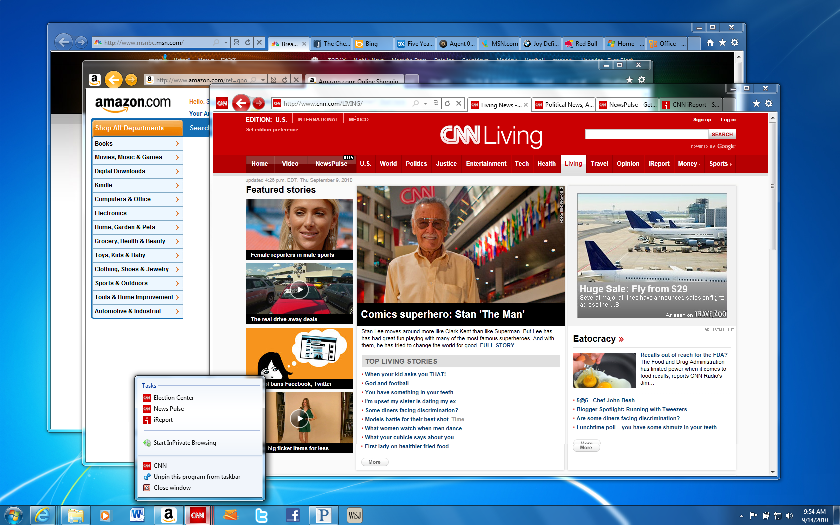Internet Explorer 9 Will Never Be on Windows XP
Looks like IE9 isn't made for the corporate world.
Microsoft this week launched the first beta for Internet Explorer 9, and most early reviews are positive. IE9 brings Microsoft's web browser up to modern standards, and that forward, progressive attitude is applying to operating systems as well – because the new Internet Explorer will never be on Windows XP.
In ditching Windows XP, the IE development team has been able to integrate IE9 into Windows 7 at a far better level than any browser yet. While multi-platform browsers like Firefox or Chrome perform well on Windows 7, IE9 has the advantage of being focused on modern Windows and has features such as webpage pinning and custom jump lists.
One of the issues, however, is that Windows XP is still the most commonly used version of Windows. From a pure user base perspective, it's odd that the biggest piece of the pie is ignored. But for a "free" piece of software like IE, Microsoft could be counting on IE9 driving some upgrades licenses from XP to Windows 7.
Another reason is that Microsoft had to leave Windows XP behind to remain competitive in the browser market, which is moving ahead with new features such as hardware acceleration.
Ryan Gavin, senior director of IE business and marketing, told the Register, "A modern web needs a modern operating system," and that Microsoft would "continue to focus on how we do a great job with Windows 7."
Get Tom's Hardware's best news and in-depth reviews, straight to your inbox.
-
victorintelr It's a pitty for XP users (like me), but well... guess it's time to move on.Reply
Now as for forcing some XP users to upgrade...mmm...some will rather try another browser specially if their computer is pretty old.
Some users lost, some users gained...it's always like that. -
Unfortunately I still didn't see any inovating, closing tabs is laggy, scrolling up-down is laggier than on chrome/ff/safari and overall the browser brings nothing new.Reply
I guess MS is just trying to be 'good enough' so that users don't switch browsers after an OS reinstall -
hellwig nforce4maxWho uses IE any more?Only people who are forced to because of various ActiveX applications or due to IE integration with other software or services. Most of these people are in the corporate sector, and are still using Windows XP. So yeah, I don't see IE9 as a big mover for Microsoft. I use IE at work, on my Windows XP machine my employer owns. Heck, I had to install IE7 myself, it was still running IE6 last summer when they re-imaged it.Reply
I run Windows 7 at home, but have no need to upgrade IE as I never use. Don't care how much better it is than IE8, it won't be better than Opera. -
thechief73 This makes sence in the fact of moving forward and supporting the new OS and emerging technologies, but as a Win XP user kinda sad I cannot update to the latest and greatist until my next build loaded up with Win7.Reply
Not trying to be a grammer snob, Im not perfect either but...Another reason is that Microsoft had TO leave Windows XP behind to remain competitive in the browser market
-
digiex ReplyIn ditching Windows XP, the IE development team has been able to integrate IE9 into Windows 7 at a far better level than any browser yet.
Another anti-trust lawsuit in he making. -
lo_vaquero nforce4maxWho uses IE any more?Reply
A vast portion of the Corporate world. At least in the US. I'd also wager that a large portion of the world in-general still uses IE, based on usage reports...=) -
dman3k I might use IE a little bit more now; but I'll still use FF for better add-ons; Opera for better total package; and Chrome if I feel like I need speed over reliability. FF4 FTW!Reply

